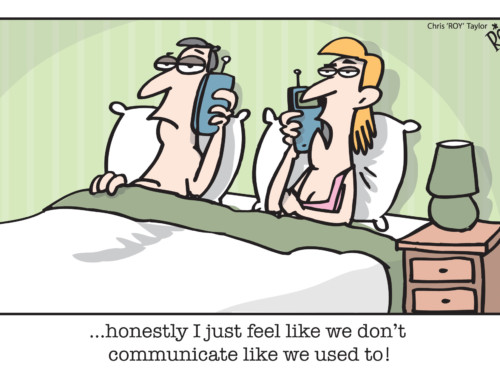When it comes to marital problems, you cannot simply insert good communication techniques and get good results. In fact, you cannot open–marriage–and–insert–any–
There is something much bigger than good communication techniques. Much bigger than statements of affirmation or acts of service. Much bigger than filling your partner’s so called love tank. That something bigger is called the emotional system—a kind of relational machine with countless moving parts. And when one part moves it impacts all of the other parts, the impact of which ripples back and forth through the system so much so that you can no longer tell which came first, the screaming or the silent treatment.
The emotional system has a kind of momentum that has been rolling hard…downhill…for a long time. For generations, in fact. Whatever problems you’re having in your relationship, you came by them honestly.
The good news is you can relax…you know who you are…you who constantly thinks about your relationships, reads relationship blogs like this one, you who analyzes, obsesses, and watches every word, every tone…both yours and your partner’s. When you begin to consider the complexity and enormity of emotional systems, the only thing that makes sense is exhaling, chillin’, lettin’ go. ♫ Let it go…Let it go… ♫ But I digress. Over thinking, over analyzing, and over communicating will get you nowhere but over it! The relationship and its problems are bigger than you and bigger than your spouse, and no amount of trying to force change is going to get the job done.
This means you’re off the hook…and so is your partner. No. Seriously. The only thing that makes sense when you adopt a systems perspective is that the on-the-hook mentality has to go. People often mistake this for zero accountability, but nothing could be further from the truth. When we can stop, for just a minute, analyzing and diagnosing and mentally, if not verbally, berating our spouses, then and only then, is there space for movement, improvement, change. Why? Because what is lacking in the majority of emotional systems is space. It too quickly gets all mucked up with automatic—as in pre-programmed—emotional reactions which give the emotional system its momentum.
When it comes to creating space in relationships, I’m not talking about avoiding-certain-topics-so-as-
To really understand how emotional systems work and how you contribute to the status quo, you’ve got to study how systems work. It’s like studying anything in the natural world—you’ve got to have a theory, a guiding body of knowledge! Here is a list of the eight principles of emotional systems theory:
- Differentiation
- Triangles
- Nuclear Family Process
- Family Projection Process
- Multigenerational Transmission Process
- Emotional Cutoff
- Sibling Position
- Societal Emotional Process
For a quick overview check out www.thebowencenter.org and click on the “theory” tab.
Meanwhile, take a chill pill and realize that this thing is bigger than you and any paltry communication techniques you’d like to install.
“Does it feel, sometimes, like the whole world is in the midst of a conversation that isn’t finished? The conversation between who we’ve been and who we are called to be? The conversation between the certainty of what we know and the humility of all we don’t? And, of course, within these conversations are the conversations that have needed to happen, but haven’t. The conversation between the rich and the poor… Between light skinned people and people of color… Between Democrats and Republicans?
I could go on… but our countenance drops when reminded of the many wedges or walls or glass ceilings preventing all the needed conversations. And a sense of despair for the times we’ve tried to begin them and the first thing we hear is, “As I was saying…”
This world is filled with division… and hungry for communion (by which I mean, communication… community…)… which calls us into holy conversations…”


